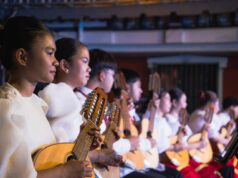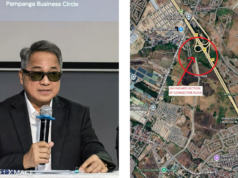MALOLOS CITY—New York-based Committee to Protect Journalists (CPJ) said in a special report released on Wednesday that murders of journalists in the country continue to go unpunished and witnesses face extreme pressures and risks.
The six-page special report entitled “Under Oath, Under Threat” was penned by Shawn Crispin, CPJ’s senior Southeast Asia representative.
CPJ is a New York–based, independent, nonprofit organization that works to safeguard press freedom worldwide.
Crispin cited the value of the government’s witness protection which he also described as “underfunded and beset by numerous shortcomings.”
As an example, Crispin highlighted in his report the 2008 murder of radio broadcaster Denis Cuesta, who was shot while walking with colleague Robert Flores along a main road in General Santos City.
The report said, “Flores came forward to identify a senior police official as one of the assassins—despite threats against him and his family.” He and his family now live in a safe house with little money or freedom as the delay-plagued case slowly proceeds to trial.
It further states, “The circumstances surrounding Cuesta’s murder conform to a disturbing pattern in this country: a journalist is shot and killed; local police manipulate the evidence to protect influential people accused in the crime; potential witnesses are intimidated, bought off, or killed so that they never appear in court; the defense employs stalling tactics to break the will of remaining witnesses; the case goes unsolved and the culture of impunity is reinforced.”
According to Crispin, fear of reprisals causes many potential witnesses to look the other way in violence-prone areas of the country, allowing for a culture of impunity to thrive.
Based on CPJ’s 2009 Impunity Index released early this year, the Philippines ranks sixth among 14 countries in the world where journalists are slain regularly and governments fail to solve the crimes.
Earlier, Lawyer Prima Quinsayas said slow prosecution of journalist murders takes its toll in the families of victims.
“The length of time is taxing on the part of the victims, financially, physically and emotionally,” said Quinsayas, who was hired by the Freedom Fund for Filipino Journalists (FFFJ) to represent families of slain journalists in court.
She said the situation is aggravated by political nature of the case.
The same is true in Bulacan where local journalists recently condemned two senior police officers for accusing another journalist as involved in illegal gambling.
The cased reached the Sangguniang Panlalawigan where a board member delivered a privileged speech calling for investigation on August 1.
The case was directed to the Sanggunian Committee on Peace and Order, but about three weeks had passed, no committee hearing has been called.
Local journalists here suspect an ‘unseen hand’ of a religious sect is in operation, thus, the investigation did not progress.
The “unseen hand” was used by the former provincial police director of Bulacan in his farewell speech last June 8 when he disclosed that local officials fear a religious sect in the province.
The six-page special report entitled “Under Oath, Under Threat” was penned by Shawn Crispin, CPJ’s senior Southeast Asia representative.
CPJ is a New York–based, independent, nonprofit organization that works to safeguard press freedom worldwide.
Crispin cited the value of the government’s witness protection which he also described as “underfunded and beset by numerous shortcomings.”
As an example, Crispin highlighted in his report the 2008 murder of radio broadcaster Denis Cuesta, who was shot while walking with colleague Robert Flores along a main road in General Santos City.
The report said, “Flores came forward to identify a senior police official as one of the assassins—despite threats against him and his family.” He and his family now live in a safe house with little money or freedom as the delay-plagued case slowly proceeds to trial.
It further states, “The circumstances surrounding Cuesta’s murder conform to a disturbing pattern in this country: a journalist is shot and killed; local police manipulate the evidence to protect influential people accused in the crime; potential witnesses are intimidated, bought off, or killed so that they never appear in court; the defense employs stalling tactics to break the will of remaining witnesses; the case goes unsolved and the culture of impunity is reinforced.”
According to Crispin, fear of reprisals causes many potential witnesses to look the other way in violence-prone areas of the country, allowing for a culture of impunity to thrive.
Based on CPJ’s 2009 Impunity Index released early this year, the Philippines ranks sixth among 14 countries in the world where journalists are slain regularly and governments fail to solve the crimes.
Earlier, Lawyer Prima Quinsayas said slow prosecution of journalist murders takes its toll in the families of victims.
“The length of time is taxing on the part of the victims, financially, physically and emotionally,” said Quinsayas, who was hired by the Freedom Fund for Filipino Journalists (FFFJ) to represent families of slain journalists in court.
She said the situation is aggravated by political nature of the case.
The same is true in Bulacan where local journalists recently condemned two senior police officers for accusing another journalist as involved in illegal gambling.
The cased reached the Sangguniang Panlalawigan where a board member delivered a privileged speech calling for investigation on August 1.
The case was directed to the Sanggunian Committee on Peace and Order, but about three weeks had passed, no committee hearing has been called.
Local journalists here suspect an ‘unseen hand’ of a religious sect is in operation, thus, the investigation did not progress.
The “unseen hand” was used by the former provincial police director of Bulacan in his farewell speech last June 8 when he disclosed that local officials fear a religious sect in the province.




